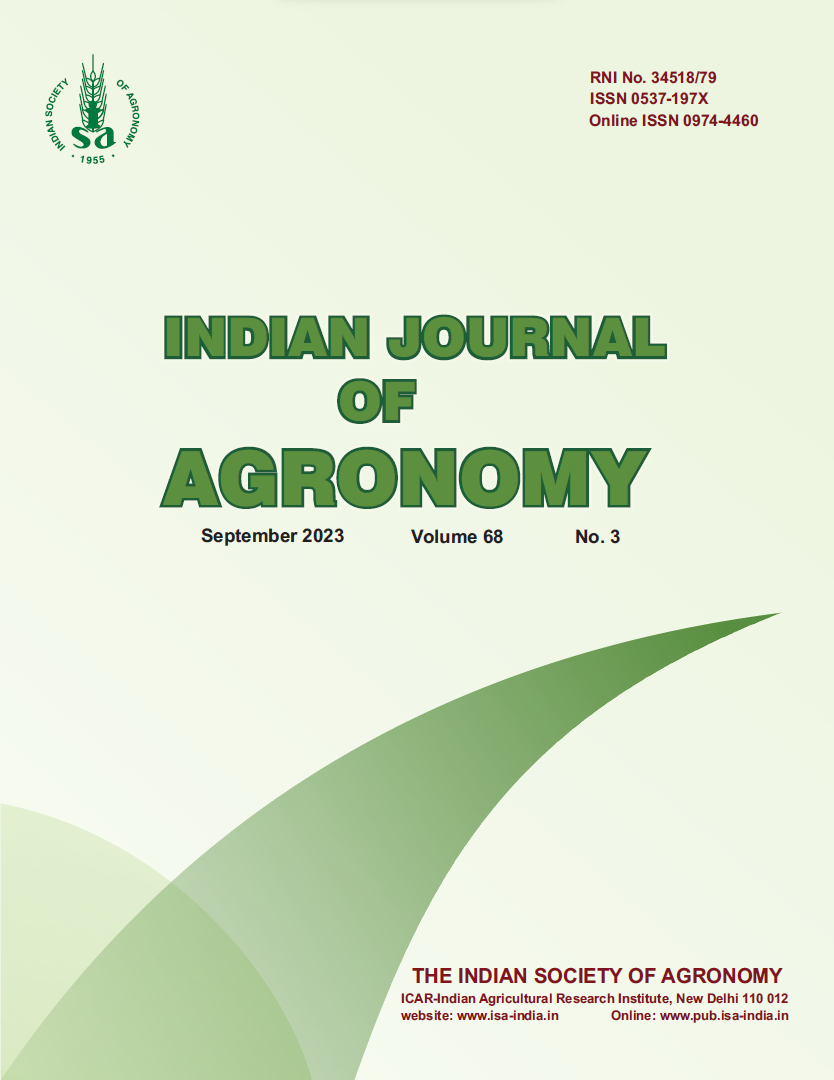Effect of zinc oxide nanoparticles application on growth and yield of basmati rice (Oryza sativa) in alkaline soil
DOI:
https://doi.org/10.59797/ija.v68i3.2800Keywords:
Basmati rice, Growth, Yield, Zinc oxide nanoparticlesAbstract
A field experiment was conducted during the rainy (kharif) seasons of 2019 and 2020 at Crop Research Centre of the Sardar Vallabhbhai Patel University of Agriculture and Technology, Meerut, Uttar Pradesh, to study the effect of zinc oxide nanoparticles (ZnO-NPs) application on growth and yield of basmati rice (Oryza sativa L.) in alkaline soil. The experiment consisted of 9 treatments, replicated thrice in randomized block design using rice variety ‘Pusa Basmati 1509’. The foliar application of ZnO-NPs increased the plant height by 17.9% at harvesting, number of tillers by 37.3%, dry-matter production by 15.1% and leaf-area index by 69.4% over soil application at 90 days after transplanting (DAT). Grain and straw yield also increased by 16.9% and 17.3%, respectively, compared with conventional fertilization of ZnSO4. Further, the foliar application of ZnO-NPs at the panicle and flowering stage was more effective with respect to the biological yield of rice and increased by 17.0% at harvesting stage. Hence foliar application of ZnO-NPs could be preferred for Zn fertilization in rice production than conventionally soil-applied sources.
References
Bana, R.C., Gupta, A.K., Bana, R.S., Shivay, Y.S., Bamboriya, S.D., Thakur, N.P., Puniya, R., Gupta, M., Jakhar, S.R., Choudhary, R.S., Bochalya, R.S., Bajaya, T., Kumar, V., Kumar, P. and Choudhary, A.K. 2022. Zinc-coated urea for enhanced zinc biofortification, nitrogen use efficiency and yield of basmati rice under Typic Fluvents. Sustainability 14(1): 104. https://doi.org/10.3390/su14010104.
Choudhary, A.K., Sood, P., Rahi, S., Yadav, D.S., Thakur, O.C., Siranta, K.R., Dass, A., Singh, Y.V., Kumar, A., Vijayakumar, S., Bhupenchandra, I., Dua, V.K., Shivadhar, Bana, R.S., Pooniya, V., Sepat, S., Kumar, S., Rajawat, M.V.S., Rajanna, G.A., Harish, M.N., Varatharajan, T., Kumar, A. and Tyagi, V. 2022. Rice productivity, zn biofortification, and nutrient-use efficiency as influenced by Zn fertilization under conventional transplanted rice and the system of rice intensification. Frontiers in Environmental Science 10: 869194. doi: 10.3389/fenvs.2022.869194.
Elshayb, O.M., Farroh, K.Y., Amin, H.E. and Atta, A.M. 2021. Green synthesis of zinc oxide nanoparticles: Fortification for rice grain yield and nutrients uptake enhancement. Molecules 26: 584. https://doi.org/10.3390/ molecules26030584.
Ghasal, P., Shivay, Y. and Pooniya, V. 2015. Response of basmati rice (Oryza sativa) varieties to zinc fertilization. Indian Journal of Agronomy 60: 403–409.
Ghoneim, M.A. 2016. Effect of different methods of Zn application on rice growth, yield and nutrients dynamics in plant and soil. Journal of Agriculture and Ecology Research International 6(2): 1–9.
Nandy, P., Das, S.K. and Tarafdar, J.C. 2022. Effect of integrated nutrient management and foliar spray of zinc in nanoform on rice crop nutrition, productivity and soil chemical and biological properties in Inceptisols. Journal of Soil Science and Plant Nutrition 23: 540–555. https://doi.org/10.1007/ s42729-022-01064-8.
Sheteiwy, M.S., Shaghaleh, H., Hamoud, Hamoud Y.A., Holford P., Shao H., Qi W., Hashmi, M.Z. and Wu, T. 2021. Zinc oxide nanoparticles: potential effects on soil properties, crop production, food processing, and food quality. Environmental Science and Pollution Research 28: 36,942–36,966. https:/ /doi.org/10.1007/s11356-021-14542-w.
Sheykhbaglou, R., Sedghi, M. and Fathi-Achachlouie, B. 2018. The effect of ferrous nano-oxide particles on physiological traits and nutritional compounds of soybean (Glycine max L.) Seed. The Annals of the Brazilian Academy of Sciences 90(1): 485–494.
Singh, A., Shahi, U.P., Dhyani, B.P., Kumar, A., Kumar, S., Vivek and Kumar, A. 2021. Response of bread wheat and nutrient removal with new micronutrient molecules fertilization. Indian Journal of Agricultural Sciences 91(5): 708–712.
Thounaojam, T.C., Meetei, T.T. and Devi, Y.B. 2021. Zinc oxide nanoparticles (ZnO-NPs): a promising nanoparticle in renovating plant science. Acta Physiologiae Plantarum 43: 136.
Zhang, H., Wang, R., Chen, Z., Cui, P., Lu, H., Yang, Y. and Zhang, H. 2021. The effect of zinc oxide nanoparticles for enhancing rice (Oryza sativa L.) yield and quality. Agriculture 11: 1,247. https://doi.org/10.3390/agriculture11121247.






